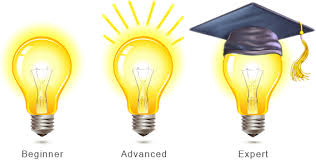
Performance Standard 1: Professional Knowledge:
The teacher candidate demonstrates an understanding of the curriculum, subject content, pedagogical knowledge, and the needs of students by providing relevant learning experiences.
Performance Indicators at the Level III Level
|
|
1.1 Addresses appropriate curriculum standards and integrates key content elements.
1.2 Facilitates students’ use of higher-level thinking skills in instruction.
1.3 Demonstrates ability to link present content with past and future learning experiences, other subject areas, and real-world experiences and applications.
1.4 Demonstrates accurate, deep, and current knowledge of subject matter.
1.5 Exhibits pedagogical skills relevant to the subject area(s) taught and best practice based on current research.
1.6 Bases instruction on goals that reflect high expectations for all students and a clear understanding of the curriculum.
1.7 Displays an understanding of the intellectual, social, emotional, and physical development of the age group.
|
Performance Rubrics
|
| Level IV |
Level III |
Level II |
Level I |
| The teacher candidate continually demonstrates extensive content and pedagogical knowledge, enriches the curriculum, and guides others in enriching the curriculum. (Teacher candidates rated as Level IV continually seek ways to serve as role models or teacher candidate leaders.) |
The teacher candidate consistently demonstrates an understanding of the curriculum, subject content, pedagogical knowledge, and the needs of students by providing relevant learning experiences. |
The teacher candidate inconsistently demonstrates understanding of curriculum, subject content, pedagogical knowledge, and student needs, or lacks fluidity in using the knowledge in practice. |
The teacher candidate inadequately demonstrates understanding of curriculum, subject content, pedagogical knowledge and student needs, or does not use the knowledge in practice. |
Examples of Evidence/Artifacts to demonstrate performance on this standard:
|
• Uses students’ prior knowledge and interests to guide instruction.
• Connects the assigned content to other content areas.
• Makes the content relevant to the students.
• Selects and uses appropriate materials and resources.
• Plans instruction that demonstrates strong knowledge of the students’ developmental needs or backgrounds.
• Encourages students to use their knowledge and everyday experiences during instruction.
• Incorporates developmentally-appropriate content. • Reflects an understanding of students’ backgrounds.
• Demonstrates knowledge of content and corrects teacher/student errors.
• Understands the scope and sequence of learning goals and objectives.
• Lesson Plans |
What it is:
|
What it isn't:
|
- Subject-matter knowledge - content to teach.
- Pedagogical knowledge - how to teach curricular knowledge.
- Learner knowledge - whom to teach.
- Cultural/community knowledge - sensitivity to settings where one teaches.
|
- Insecurity about subject matter.
- Inability to give or limited ability to give appropriate explanations in the classroom.
- Lack of confidence in the classroom which impacts planning and teaching.
- Closed and constrained pedagogy.
- Avoiding open-ended questions or conducting discussion sessions.
- More authoritative in what they plan and do in the classroom.
|
Content Knowledge That Leads to:
|
Sample Questions for Conferencing:
|
- Asking higher-level questions.
- Encouraging students to explore alternative explanations.
- Involving students in more inquiry-based learning.
- Allowing more student-directed activities.
- Engaging students in the lessons.
- Making connections across subject areas.
- Using a wide variety of sources and making meaningful connections to sustain students’ inquiry across disciplines.
- Observing (through surveys and conversations) that teachers help them understand rather than judge them for misconceptions.
- Grasping the meaning as well as the facts of the content they are learning.
- Recognizing and discussing issues related to the content area.
- Acknowledging the teacher’s efforts to make the curriculum challenging, relevant, and rewarding for all learners.
- Performing tasks that are varied and appropriate for all learning levels.
- Engaging in learning activities that lead to most students achieving standards and some exceeding them.
- Engaging in projects, essays, and research that relate to content areas to real life experiences.
- Explaining how major concepts in content areas relate.
|
- How did you ensure that all students understood and grasped the concept that you were teaching?
- How did you develop your plans and decide what to include or exclude from them?
- How have you worked to expand your understanding of the issues in your content area?
- What are your expectations and the appropriate learning outcomes for the grade level/subject matter you teach?
- What are some ways that you added relevance to the curriculum and helped students make real-world connections?
|
Reference and for more information visit
https://www.gadoe.org/School-Improvement/Teacher-and-Leader-Effectiveness/Documents/TKES%20Fact%20%20Sheets%207-11-2012.pdf
